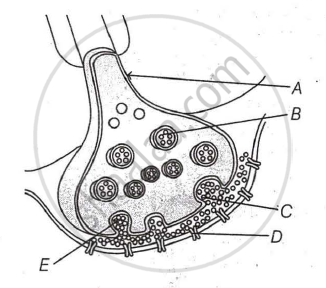Advertisements
Advertisements
प्रश्न
The action potential occurs in response to a threshold stimulus; but not at sub-threshold stimuli. What is the name of the principle involved?
उत्तर
However, an unusual event occurs when the magnitude of the depolarization reaches a level of membrane potential called the threshold.
संबंधित प्रश्न
Briefly explain the following terms: Synapse
With the help of a suitable diagram describe the structures of a neuron.
Define the term Sensory neuron.
Define the term Neuron.
Describe the two parts of the nervous system.
Given below is a structure, write its special functional activity.
Myelin sheath and ……………
Rearrange the following in correct sequence pertaining to what is given within brackets at the end.
Effector - Sensory neuron - Receptor - Motor neuron - Stimulus - Central nervous system Response (Reflex arc)
Rearrange the following in correct sequence pertaining to what is given within brackets at the end.
Repolarisation - Depolarisation - Resting (polarised) (during conduction of nerve impulse through a nerve fibre)
Name the following:
The third neuron that is involved in reflexes, other than simple reflex.
How does an impulse travel across a synapse?
Draw a labeled diagram of a myelinated neuron.
Assertion: The imbalance in concentration of Na+, K+ and proteins generates action potential.
Reason: To maintain the unequal distribution of Na+ and K+, the neurons use electrical energy.
All of the following are associated with the myeline sheath except
The neurons which carry impulse from the central nervous system to the muscle fibre.
What are the different parts of the multipolar neuron?
______ is the gap between the axon of one terminal neuron and the dendrites of next neuron.
Which nerves transmit impulses from the central nervous system towards muscle cells?
Electrical impulse travels in a neuron from
In the following diagram choose the correct labelling for A, B, C, D and E respectively.

Define the following term:
Synaptic cleft
